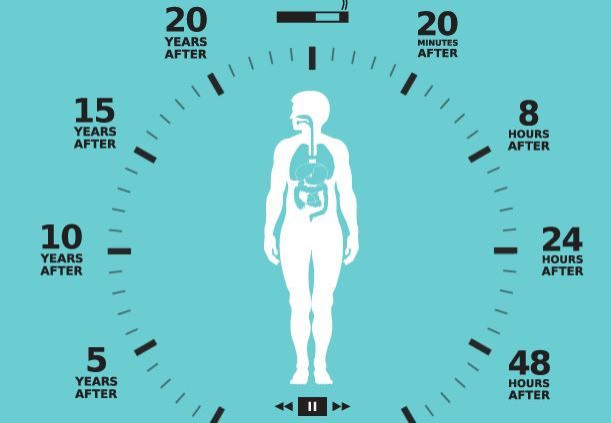Quitting Smoking: For 40 Days Of Lent, This Is What Would Happen To Your Body If You Stopped Smoking [INFOGRAPHIC]

Quitting smoking for even just 20 minutes can already have a positive effect on your body, from your lungs to your brain. But what if you chose to give up smoking for Lent? That’s right, 40 days and 40 nights of not smoking could actually be a good way to jumpstart your new tobacco-free life, and the effects on your body will be transformative.
- 20 Minutes: Within 20 minutes of quitting smoking, your blood pressure and pulse rate will return to normal.
- 24 Hours: At this point, things may start to get a little difficult; your anxieties and withdrawal symptoms will reach their peak in intensity. Some of these withdrawal symptoms include intense cigarette cravings, anger, frustration, anxiety, depression, and irritability. As smokers often rely on cigarette breaks to reduce such stressful feelings, they might find it hard to overcome such emotions and without having their nicotine fix, which in turn exacerbates them. At the same time, the level of carbon monoxide in your blood has been reduced to normal by now.
- 48 Hours: Two days in, and things will start to get better. Your ability to smell and taste things will have greatly improved.
- 2 Weeks: Two weeks seems to be the make it or break it point: The negative withdrawal symptoms and side effects begin to disappear, your circulation improves, and your lungs begin to heal for real. You’ll begin to feel more energetic, experience less coughing and shortness of breath, and have improved sinuses.
- 30 Days: Day by day, your negative effects continue to decrease until they’re nearly completely gone. As your walking, energy, and lung health improves, the cilia or tiny hairs lining your lungs work normally again. Their function is to clean out your lungs to help avoid infection — and they’ll be better at doing their job now that you’re not destroying them with black tar.
- 40 Days: You did it. Now all you have to do is keep it up. Things are easier now; the first few weeks are the hardest. Remember as you move forward that one year after quitting, your risk of coronary heart disease, heart attack, and stroke drops by 50 percent. Five years after quitting, the risk of a subarachnoid haemorrhage decreases by 41 percent, and your diabetes risk declines as well. Twenty years later, if you’ve still maintained your sobriety from cigarettes, your risk of chronic diseases and death will have reduced to that of a non-smoker.
Click on the interactive graph below to better view how quitting smoking will change your body for the better over the course of two decades.
Published by Medicaldaily.com
Join the Discussion



























